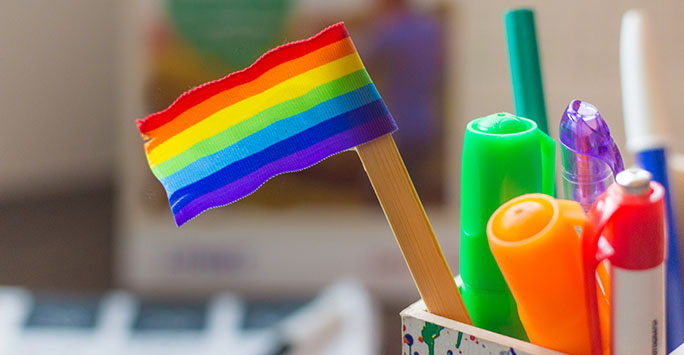On the Road to Equality: LGBT+ Inclusive Relationships and Sex Education
Posted on: 26 June 2020 by Rachel Heah in Blog

Rachel is one of our Liverpool Law School alumni, graduating with an LL.B (Hons) in 2014 and completing her PhD in 2020. Her PhD research looked at the provision of sexuality education across English secondary schools, from a children's rights perspective. Rachel is a non-practising Barrister and member of the Honourable Society of the Inner Temple. Rachel now works at Lancaster University as a Lecturer in Law.
This Pride month, I feel privileged to have been given the opportunity to reflect on the importance of LGBT+ inclusive Relationships and Sex Education, following the planned overhaul of the existing curriculum on Sex and Relationships Education in English schools.
Pride month is celebrated in memory of the Stonewall Uprising in 1969, which represented a major victory for LGBT+ individuals in their struggle for equal rights and recognition. More than 50 years on from the Stonewall Riots, many parts of the world have certainly come far in their recognition and protection of LGBT+ individuals. In the UK, same-sex relationships have been formally recognised since 2004 (with the passing of the Civil Partnership Act 2004, and subsequently, the Marriage (Same Sex Couples) Act 2013. Discrimination, whether direct or indirect, harassment or victimisation on the basis of gender and sexual orientation is also prohibited under the Equality Act 2010.
However, research by Stonewall found that in 2017 alone, 1 in 5 LGBT+ people in Britain have experienced a hate crime or incident due to their sexual orientation and/or gender identity, and that LGBT+ individuals continue to experience discrimination in daily life. This is evidence that although there has been much progress in advancing the rights of LGBT+ individuals, more still needs to be done.
One way to combat such discrimination is through education. Currently, although Sex and Relationships Education (SRE) is taught in many English schools, the National Guidance does not prescribe specific content for the subject, leaving this instead to the discretion of individual schools. In consequence, there are variations in how and what is taught as part of the SRE curriculum across schools, and evidence shows that there is little coverage of LGBT+ issues. According to a survey by the Terrence Higgins Trust, only 5% of young people had LGBT+ inclusive SRE, even though 97% of survey respondents felt that their lessons should have been more inclusive of LGBT+ issues. As part of my PhD research, I conducted focus groups with secondary school pupils on their experiences of SRE lessons. Many of the participants in the research commented on the lack of diversity in their SRE lessons. For example, one participant said:
"[I]n a society where we are taught homosexuality is okay, why isn't gay sex talked about in sex education because to people my age, it makes it seem like homosexuality isn't acceptable.”
(Participant, Pilot Focus Group 1)
Other participants in the research who identified as being LGBT+ also talked about feeling excluded from the SRE curriculum, which seemed to only cover heterosexual relationships. These made them feel as if they were not accepted, or that their identities had been ‘erased’. For example, another participant said:
“[I] feel as though if being trans was talked about more, people would be more understanding and accepting."
(Participant, Pilot Focus Group 1)
Even worse, Stonewall’s School Report on the experiences of LGBT+ British school pupils from 2017, evidences that 45% of LGBT+ pupils are bullied on the basis of their gender/sexual orientation, whilst 52% frequently hear homophobic language at school.
There is therefore a strong argument for SRE to be more inclusive of LGBT+ identities and experiences. Children and young people who identify as being LGBT+, or who have LGBT+ family members, should not be made to feel any ‘lesser’ than their non-LGBT+ peers. Education is one of the best ways of teaching inclusivity and for normalising LGBT+ identities. Contrary to what some may think, LGBT+ education, framed within a fact-based and human-rights based approach does not indoctrinate children. In fact, it does quite the opposite – it teaches children and young people to be respectful, understanding and accepting.
The new Relationships and Sex Education (RSE) curriculum for English schools prescribes far more LGBT+ inclusive content. For instance, primary schools are encouraged to teach about different types of families (which can include LGBT+ families), whilst secondary schools are required to explore sexual orientation and gender identity at a timely point. This is certainly a step in the right direction, but in my opinion, the language of the new Guidance is suggestive rather than mandatory, indicating that schools will retain some discretion as to what is ultimately taught in RSE lessons. There is a lack of specificity in terms of what exactly is to be covered, and when these topics are to be introduced. Due to the Coronavirus pandemic, schools will be given more time to roll out the curriculum, so how far they will go in implementing the curriculum is a matter which remains to be seen.
On the other hand, Scotland is set to be the first country in the world to embed a fully LGBT-inclusive education across the entire school curriculum, rather than as a standalone subject. Schools will be required to teach pupils about the history of LGBT+ equalities and movements, explore LGBT+ identities, and tackle homophobia and transphobia. This is a huge step forward on the road to equality, and it is hoped that English schools will soon follow suit.
Keywords: LGBT, Children's rights, Pride, Education, European Children's Rights Unit, Law, Social Justice.